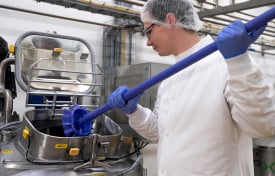FSMA

- February 24, 2021
Not only has COVID put a significant dent in our social lives, but it also has impacted many operations and practices throughout food processing facilities. Unfortunately, this
- September 10, 2018
In our efforts to help our customers produce the best safe, quality food that they can, we like to occasionally share resources that may be of use. Below, you will find a link discussing the Food Safety Modernization Act (FSMA) Training and Consultative Service program, (officially titled the Artisan Dairy Producer Foods Safety Initiative). In an effort to assist smaller businesses and producers, the Center for Dairy Research, Dairy Farmers of Wisconsin, and the Wisconsin Cheese Makers Association have come together to provide guidance for small businesses to meet the demands of FSMA compliance. John Lucey, from the Center for Dairy Research discusses the Initiative further here:
- March 22, 2018
In the demanding everyday life of a food manufacturer it can be hard to slow down and think about the safety of the products being manufactured. Everything from the ingredients that come in the door to the way the product is shipped out to the customer, all have to be monitored for safety. That is what the Food Safety Modernization Act (FSMA) is all about, making sure the ingredients, the process, and how the end product is shipped out reduces the level of risk to the consumer. The manufacturing facility has to ask, what can be done to prevent the various risks in the plant from happening and causing a recall?
A Food Safety Plan is a robust, detailed plan that is meant to anticipate and meet these challenges. A cohesive plan is based on food safety principles which include: hazard analysis, preventative controls, supply-chain programs, and a recall plan. For smaller businesses, putting a Food Safety Plan in place and maintaining that Plan can be daunting. Where do you start? Making
- October 28, 2015The 2015 trade show season is coming to a close...one of our final shows is the Dairy Practices Council (DPC) Annual Conference in Burlington, Vermont, November 4-6.
- September 11, 2013
The new Food Safety Modernization Act (FSMA) requires registered food companies (including Nelson-Jameson, Inc. as a “holder and transporter” of food) to develop risk-based food safety plans. Included in this plan for food processors must be critical control points (CCPs), where known hazards related to raw materials and finished products are controlled.
For example, brine used to preserve a ham must contain sufficient salt, sugar and other dissolved ingredients to lower water activity and prevent growth of pathogens. Other control points include pH, allergen prevention, temperature (both processing and storage), among others.
Each of these control points are monitored in “real time” by some means, often with a continuous recording device or hand-held monitoring system. In today’s world of third







